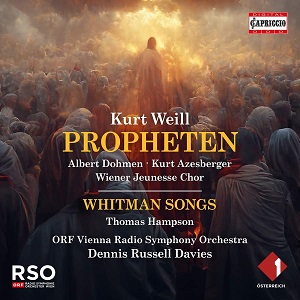
Kurt Weill (1900-1950)
Propheten: A Biblical Cantata from Der Weg der Verheissung (1934-1935)
Text by Franz Werfel and from scripture
Four Walt Whitman Songs (1942-1947)
rec. live 28 May 1998 (Propheten), Konzerthaus, Vienna, Austria; 30 July 2001 (Whitman Songs), Felsenreitschule, Salzburg, Austria
Texts in German and English included
Capriccio C5500 [65]
This is a recording of part of a grandiose project for which Weill wrote the music. The project was the idea of the Zionist Chaim Weizmann, later the first president of Israel, and he enlisted Max Reinhardt as director, Franz Werfel as writer and Weill as composer. It was to be a pageant embodying Jewish history and Zionist ideas and was intended, among other things, to bring the plight of European Jews under the Nazis to the attention of the American public. In German the work was titled Der Weg der Verheissung, The Road of Promise, but the English translation by Ludwig Lewisohn was retitled The Eternal Road. This received a stage production in New York in 1937 and ran for over 150 performances, but the production was so lavish that it lost money.
Since then, there have been various attempts to rescue it. Missing sections were reconstructed by Noam Sheriff and John Mauceri, and Mauceri conducted a complete performance in German in 1999. This was recorded and would have been a splendid addition to Decca’s Entartete Musik series of works by Jewish composers persecuted by the Nazis, but it was not to be. There have been partial recordings (in English, not the original German), as The Eternal Road by Gerard Schwarz (Naxos) and The Road of Promise by Ted Sperling (Navona Records). What we have here is the first complete commercial recording of the fourth and last part, Prophets in German. (The first three parts are Patriarchs, Moses and Kings.) The recording was actually made in 1998, and clearly the sleevenote was prepared around then, as one article is by the Weill expert David Drew, who died in 2009. At the time, the Capriccio label was putting Weill lovers in their debt by recording most of his German theatre works, and this would have been one of them. I thought this might be a reissue, but it appears not; this seems to be its first appearance. I don’t know why they have waited twentyfive years to release this or whether they recorded the other three parts at the same time.
The work dramatises the last days of the Southern Israelite kingdom of Judah, and its fall to the Babylonians in 587 BCE. This was prophesied and then witnessed by Jeremiah (Jeremias in German), and Isaiah (Jesajah) is also brought in and there are brief contributions from angels and a Narrator holds the account together. The whole is contemplated by a then contemporary audience, including a Rabbi and a child who asks questions about it. So much for the story. What about the music? Drew, in his indispensable handbook to Weill’s works, says that Weill drew on the nineteenth century oratorio tradition, as embodied by Mendelssohn and Gounod, with perhaps Honegger’s then recent Le roi David also offering a precedent. (Schoenberg’s Die Jakobsleiter was as yet unperformed and unknown.) Weill apparently considered the work a dramatic oratorio.
However, I find it to be hardly that. Rather, it is a pageant with incidental music. The musical numbers are nearly all short and there is a great deal of spoken dialogue. As for the musical idiom, what I hear is that of Weill’s Die sieben Todsünden of a few years earlier. But whereas Die sieben Todsünden is tightly constructed, cogently argued, and every number packs a punch, Propheten is sprawling, diffuse and dissipates its energy in the uncertainty of its aim. The musical numbers, such as they are, are quite attractive, though I don’t think there is anything here that Weill had not done better before. Apparently he draws on Jewish liturgical music in places, but that does not really make much difference. I am sorry to say this, as I was hoping for an undiscovered masterpiece. Instead, I think it is a curiosity, of considerable interest to Weill devotees, who have long wondered what this work was really like, but less so to others.
The performance is a good one, with Albert Dohmen taking the most important role, that of Jeremias, with a strong supporting cast, two choirs, strong orchestral playing and committed conducting by Dennis Russell Davies. As a filler we are offered Weill’s Four Whitman Songs, sung in English by Thomas Hampson, an old Weill hand. The first is quite stirring, rather in the manner of Mahler’s Der Tamboursg’sell; the others are blander and rather anonymous. This is not their first recording in orchestral form, though I should note that Weill turned over the orchestration of the third song to Irving Schlein; the fourth was written after the others and orchestrated by Carlos Surinach.
The recording is good and the presentation immaculate, in the manner of Capriccio’s Weill releases of the 1990s. The single disc is presented in a box, with full texts in German and English and useful background material. Still, this is one for specialists.
Stephen Barber
Previous review: Göran Forsling (August 2023)
Help us financially by purchasing from



Performers
Jeremias (Jeremiah)/Voice of Solomon: Albert Dohmen
Rabbi: Kurt Azesberger
Jesajah (Isaiah), First White Angel, Angel of the End of Time: Michael Pabst
Widersprecher The Adversary): Gottfried Hornik
Chananjah (Hananiah), Rahel (Rachel), A Woman: Ursula Fiedler
Der Dreizehnjähige (The Thirteen-year-lod boy): Georg Tsulufis
Erzahler (Narrator): Anselm Lipgens
Wiener Jeunesse-Chor, Wiener Motettenchor, Gumpoldskirchner Spatzen, ORF Vienna Radio Symphony Orchestra/Dennis Russell Davies
Thomas Hampson, ORF Vienna Radio Symphony Orchestra/Dennis Russell Davies


















